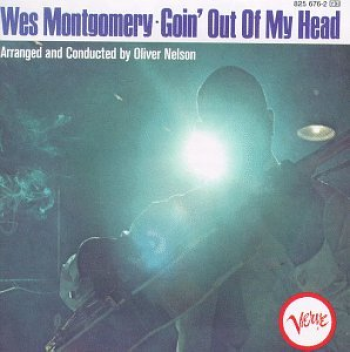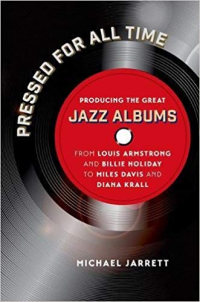.
.
Drawn from interviews with prominent producers, engineers, and record label executives, Michael Jarrett’s Pressed For All Time: Producing the Great Jazz Albums is filled with interesting stories behind some of jazz music’s most historic, influential, and popular recordings. In cooperation with Jarrett and University of North Carolina Press, Jerry Jazz Musician will occasionally publish a noteworthy excerpt from the book, which is now available in trade paperback.
.
In this edition, producer Creed Taylor recalls working with the guitarist Wes Montgomery on his 1965 Verve album Goin’ Out of My Head
.
.
Goin’ Out of My Head, by Wes Montgomery
.
___
.
.
One of the most successful producers in jazz history, Creed Taylor’s career included creative positions at Bethlehem Records, ABC Paramount, Verve, and A&M Records. In 1960, he founded Impulse Records, and in 1968, founded CTI (Creed Taylor International) Records.
.
.
.
.
___
.
.
…..I have to give Oliver Nelson an awful lot of credit for breaking the ice for me with Wes, musically, when he was able to put together this crazy thing. I had a 45 copy of “Going Out of My Head” by Little Anthony and the Imperials. I gave it to Wes one night at the old Half Note down on Hudson Street. He took it home and listened to it, and he nearly flipped out. I had to talk to him. “It’s not the treatment. We’re not talking about the fact that it’s done by a doo-wop group” – or whatever the idiom was called at that time – “that has nothing to do with it. This song’s got great changes. It’s a well-structured composition. Give [arranger] Oliver Nelson a shot at putting this thing together, something you can play on.” That’s how that came about.
…..Once Wes got into the studio and started playing, he was beaming from ear to ear. Then, that just carried forward to the A&M stuff that happened after Verve. There was no pressure on me. I thought we had the chance with good distribution to make Wes Montgomery popular. Period. I certainly couldn’t care less what anybody else thought about it. My business was to make an appealing framework, a setting for the artist and not to say hands-off because he’s jazz and that’s pure art. Wes couldn’t play anything that wasn’t appealing anyway. He had to be put into orchestral contexts in order to get the programmer director’s attention at radio, to get him out to people who could not fathom the quartet context.
…..Was he at all embarrassed about having a hit?
…..Wes didn’t mince any words, and he never complained about anything, period. If he felt like he was being put in a compromising position, musically speaking, he would have said, “Creed, I’m only going to go so far. This is too far.” At any point he could have said that. Or he could have radiated that feeling, and I would have picked up on it. But that wasn’t the case. In John Levy, he had a great manager that fit Wes like a glove. I don’t know if you know, but John was the original bass player with the George Shearing Quartet. He understood Wes, and he understood hardships of the road, and he understood how to negotiate with concert promoters. As a result, John took these widely appealing recordings and started getting Wes booked in major concert venues. Unfortunately, Wes passed away before he could really sit back and enjoy the fruits of his talent.
.
___
.
.
Listen to Wes Montgomery play “Goin’ Out of My Head”
.
.
.
.
_____
.
.
From Pressed for All Time: Producing the Great Jazz Albums from Louis Armstrong and Billie Holiday to Miles Davis and Diana Krall. Copyright © 2016 by Michael Jarrett. Published by the University of North Carolina Press. Used by permission of the publisher. www.uncpress.unc.edu
.
.
___
.
.
photo by Pamela Jarrett

Most of Michael Jarrett’s writing on jazz production appeared in Pulse!, Tower Records’ magazine. His day job, however, was professor of English at Penn State University (York Campus). In addition to .Pressed for All Time, his book about jazz record production, Jarrett wrote. Drifting on a Read: Jazz as a Model for Writing; .Sound Tracks: A Musical ABC; and .Producing Country: The Inside Story of the Great Recordings. He is now retired. He and his wife live in the village of Ojochal, on the southern Pacific coast of Costa Rica.
.
.
.









































